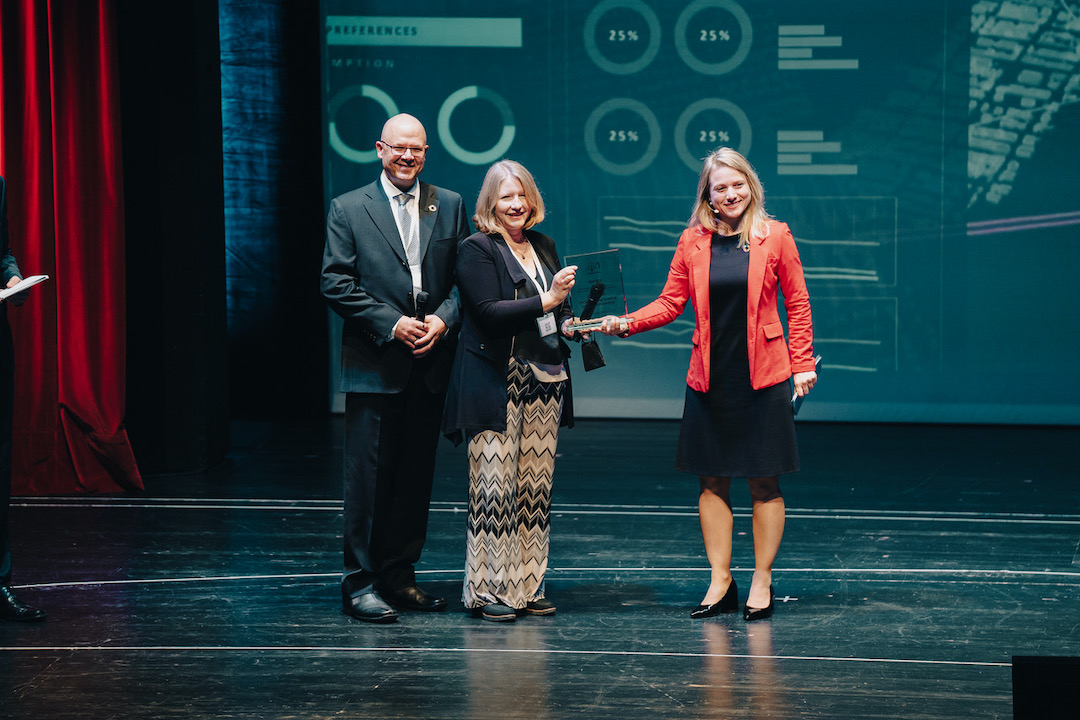The $3.5 million investment RUNWITHIT Synthetics has received from Raven Indigenous Capital Partners will allow the company to create new products for more customers across the globe and to hire more people, including in business development, to allow it to establish further hubs for people who make change.
Myrna Bittner, a founder and the CEO of RWI, told Taproot that the investment could allow more people to experiment with RUNWITHIT's visualization tools, suggesting the analogy of offering people keys to a satellite to enable them to build their own version of Google Earth. "Some want to build a spaceship and others just want to fly in it," she said.
Bittner is more of the spaceship-building type, having helped found several tech companies since 1992 and co-creating RUNWITHIT in 2014. The company uses synthetic, augmented data to build models of the real world that users can manipulate. Its award-winning synthetic model of the Edmonton region, called SEEITAL, visualizes 14 counties across the region and allows users to run scenarios using data sets. That and other RWI tools let users model the potential future of the region's hydrogen economy and its transition toward hydrogen.
"We're really on a growth trajectory," Bittner said. "That not only means that we have a variety of products that we want to bring to market, but we're also on a geographical trajectory where now we're needing to be in so many more places at the same time, in terms of sales and customer support."
Bittner didn't name a specific tool that the new investment might create but said she wants to build ones that are accessible for people who aren't technical experts but are nonetheless skilful in other fields. The company wants to sell more tools that combine visuals, data, and insights, but also require a lighter touch from RWI's tech-savvy team.
"The theme of our product road map is putting our insight, our data, our tools and technologies, and our know-how in the hands of other people who are seekers and changemakers so that they can run with it," Dean Bittner, the other founder of RWI, told Taproot. "That's always been in our name, and in our intent to really get all what we do in the hands of other people."
Dean is a sixth-generation descendent of Mistawasis, a signatory of Treaty 6. His heritage made RWI suitable for Raven's investment as the partners of the capital investment organization, based in Vancouver, focus on Indigenous-led businesses. Representatives with Raven have said their investors see RWI's potential to foster more sustainable and equitable futures.

RUNWITHIT Synthetics founders Dean Bittner (left) and Myrna Bittner (middle) want to use a $3.5 million investment the company has received to build new products, extend their global reach, and hire team members. They are pictured here in 2021, receiving the United Nations Industrial Development Organization Global Call Award for Decarbonizing Growing Urban Environments in Remscheid, Germany. (supplied)
It doesn't hurt that RWI has synthesized more than 250 cities that are home to 50 million people, either. But the Bittners aren't stopping there.
"There is a profound opportunity for people to … access the augmented, synthetic data that we can provide that highlights never-identified populations, intersectionality, futures of health, economics, and built-environment growth for their communities," Myrna said. "That really can offer them a valuable opportunity for engagement and advancement and strategy."
Myrna and Dean want to grow RWI's presence globally. Part of that is its Regional Advancement Labs Initiative (the REAL Initiative, for short). Using RWI's data and tools, subscribers to the labs tackle community challenges. The one-year-old Edmonton lab has completed about 18 projects so far, on topics that include the sense of belonging among youth and energy burden.
The company has other labs at work in Calgary, Kitchener-Waterloo, Nashville, Los Angeles, Miami, and one that "has taken baby steps" in Vancouver. The next to launch is in Fairbanks, AK.
Next up for the Edmonton lab are projects on hydrogen safety, immigration, and migration.
